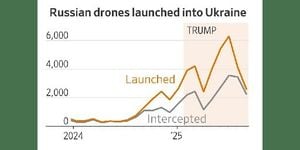In a significant geopolitical shift, tensions have escalated surrounding the Panama Canal, fueled by a contentious sale involving Hong Kong billionaire Li Ka-shing and the U.S. investment firm BlackRock. Following President Donald Trump's assertive remarks about regaining control over the Panama Canal from China, Li's announcement to sell most of his global port assets, including two pivotal ports at the Panama Canal, has drawn sharp criticism from China.
On March 4, 2025, it was reported that BlackRock would acquire an 80% stake in Hutchison Ports, which is owned by Li Ka-shing's CK Hutchison Holdings, for $22.8 billion. This deal places BlackRock in a powerful position, potentially enabling it to control about 10.4% of the world's container throughput, thereby becoming one of the three largest port operators globally.
China's Hong Kong and Macau Affairs Office (HKMAO) expressed outrage at Li's actions, accusing him of betraying the Chinese people. The HKMAO published an article entitled "Don’t Be Naive and Misled," urging Li to reconsider the transaction, as the timing coincided with Trump’s comments about retaking the canal, made shortly after his inauguration.
Wang, a commentator involved in the discourse, warned that the deal could motivate BlackRock to implement policies unfavorable to China, thereby increasing the cost for Chinese shipping companies and limiting their market share. Wang further speculated that the U.S. might leverage this ownership to promote more mergers and acquisitions of global ports, using legal means to restrict operations for Chinese vessels.
Trump's statements about the Panama Canal have been designed to appeal to American national security interests, which he stated during his inaugural address on January 20, 2025. Unlike before, the canal, renowned for its strategic military value, is now under the influence of a Chinese company. Trump’s administration initiated consultations regarding imposing hefty fees on Chinese vessels docking in U.S. ports, including proposals for fees reaching $1.5 million, reflecting growing tensions between the two superpowers. These consultations are set to conclude on March 24, 2025.
Amidst these developments, the Panama Canal's operational landscape is also shifting. On March 11, 2025, reports surfaced that the canal was planning to venture into gas transportation through pipelines capable of handling millions of barrels per day, targeting major customers in Asia. This pivot is a clear indication of Panama’s growing engagement with the broader global market amidst challenging geopolitical conditions.
The recent criticism against Li Ka-shing also sheds light on the broader implications of the deal for China. Zhou Mi, a senior researcher at the Chinese Academy of International Trade and Economic Cooperation, asserted that the potential fee imposition on Chinese vessels constitutes a unilateral violation of World Trade Organization rules, which could elevate logistics costs and ultimately affect American businesses that may pass on these costs to consumers.
Despite CK Hutchison branding the transaction merely a commercial decision expected to yield $19 billion in cash, analysts in the U.S. are scrutinizing the geopolitical ramifications. The Center for Strategic and International Studies (CSIS) indicated that while the transaction addresses some concerns in Washington over China's influence in the region, it also signifies a crucial shift in power dynamics across the Americas.
Interestingly, sources revealed that China was not informed about the agreement before its public announcement, with an anonymous official indicating that Beijing was taken by surprise. On March 5, during a regular press conference, a spokesperson for China’s Foreign Ministry, Lin Jian, refrained from commenting on the deal, emphasizing that it was a commercial matter and not influenced by recent political developments.
Compounding the situation, Panama's recent decision to withdraw from China’s Belt and Road Initiative has further strained relations. Having opted not to renew its participation in this significant infrastructure project, Panama has faced pressures from both sides, as U.S. Secretary of State Marco Rubio praised Panama’s shift as a substantial step forward in U.S.-Panama relations.
As this narrative unfolds, the implications for U.S.-China relations are profound. Both nations remain global powers, continuously vying for influence in Latin America and beyond. The ramifications of Li's decision to sell his ports and the potential control by BlackRock pose critical questions about the future of international trade and shipping routes influenced by political agendas.
Looking ahead, the complex interplay between commerce and geopolitical strategy will undoubtedly shape the dynamics of global shipping and international diplomacy in the coming years. As events continue to evolve, stakeholders in both the United States and China will be watching closely to see how this situation develops and what it could mean for the global economy.




